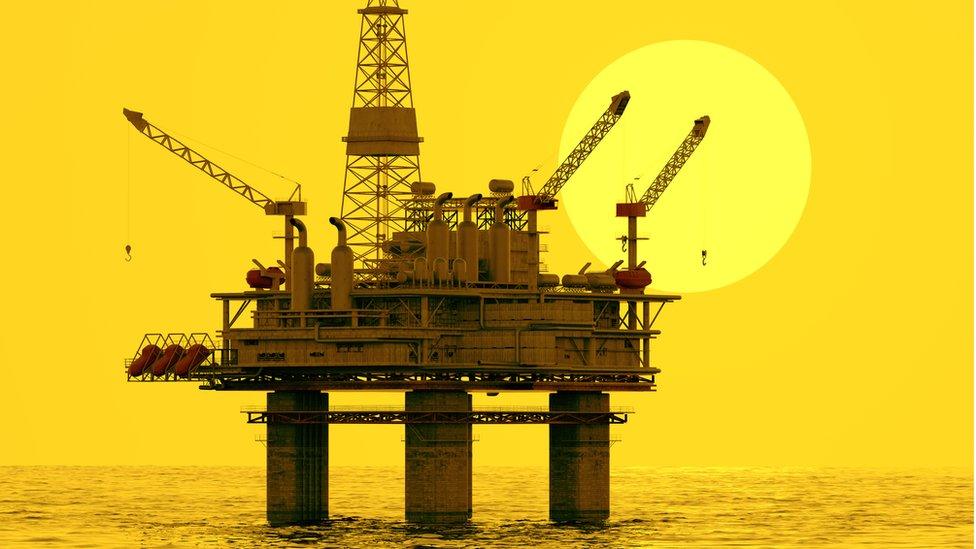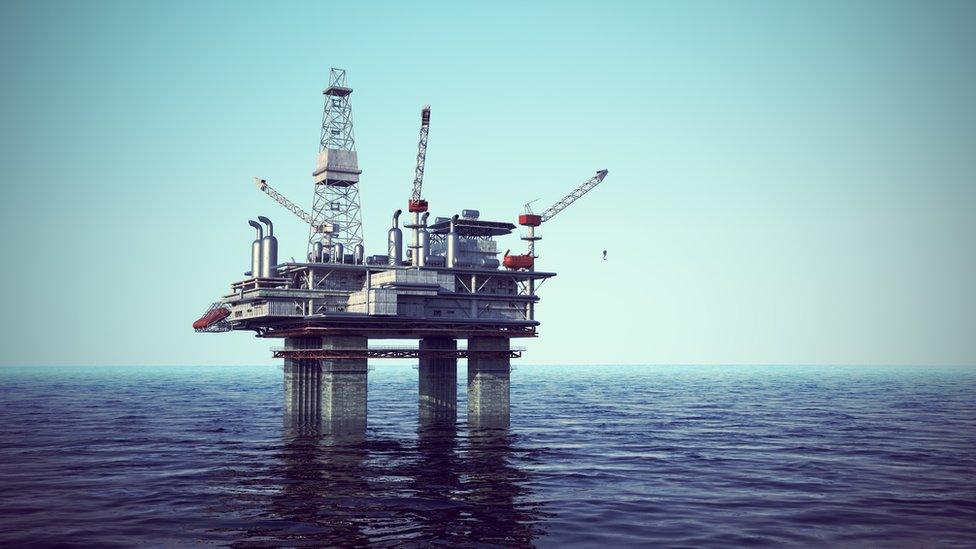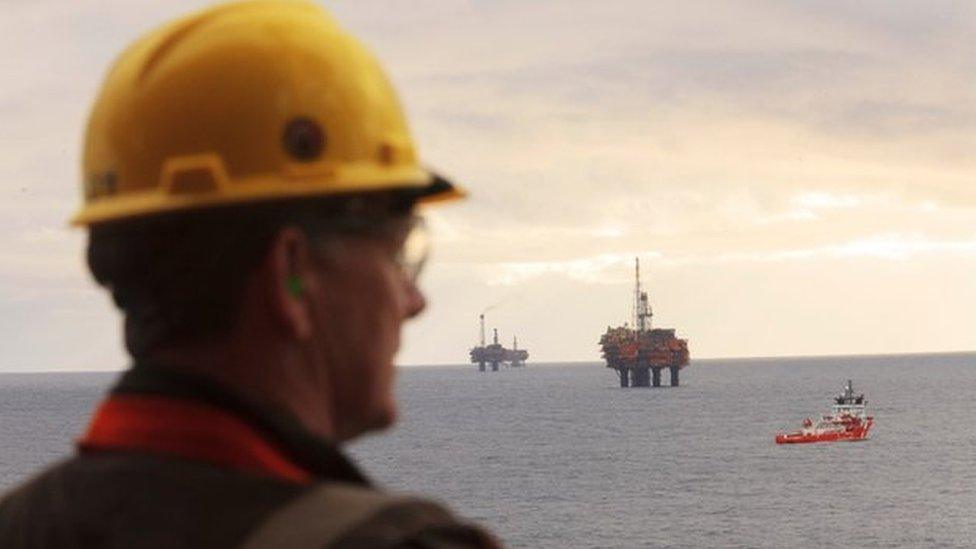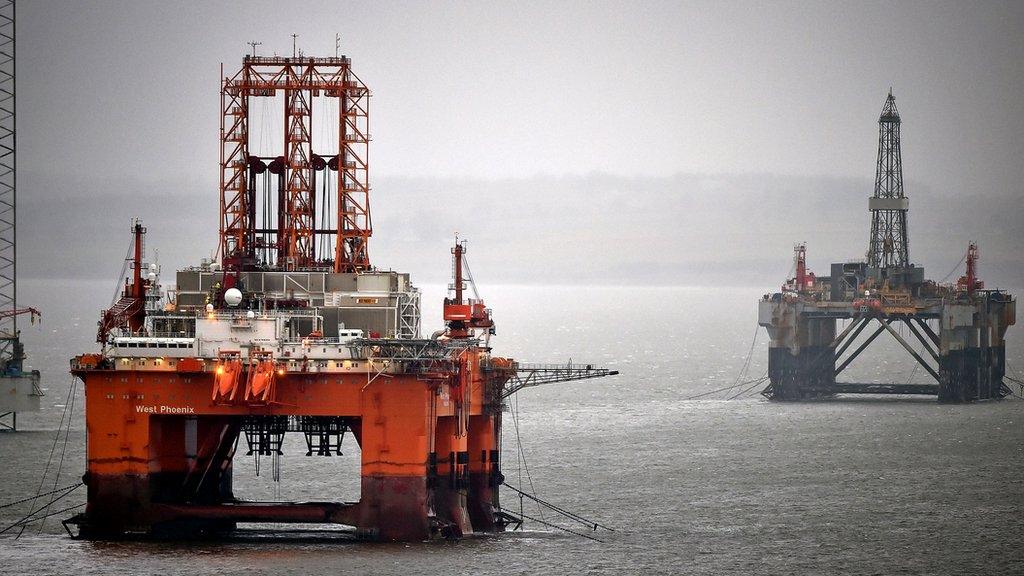North Sea oil: Falling off the cycle?
- Published

The global oil and gas industry will recover. That's for sure. The speed at which it does so partly depends on the informal meeting of the OPEC cartel in Algeria this week.
What is less clear is whether the UK's offshore oil industry will recover to anything like its previous position.
The latest assessment from the industry makes for some good news. Production is up for a second year.
It has adapted to the downturn by slashing the unit cost of producing the average barrel of oil from British waters, down from $29 to $16. That's expected to level out at $14 or $15.
That decline has come at a high price in terms of jobs, and the pay and conditions of those still in work.
But in the boom and bust cycle of this industry, cost-cutting was essential if capital funds were to continue to flow.
However, they aren't flowing fast enough to maintain the momentum the industry needs.

Relying on offshore equipment which companies either use or lose due to cost and corrosion, it needs a steady flow of new funds to lengthen the lives of platforms and pipelines.
And in turn, that requires new reserves being found, and long-discovered but unexploited reserves being newly developed.
Neither is happening on anything close to a sufficient scale for the industry's return to health.
Among many startling figures in the Oil and Gas UK economic report, one stand-out is the decline in committed investment from £4.3 billion last year to £100m this year.
Companies have been re-classifying their reserves, removing billions of barrels from recoverable status.
These are mostly in hydrocarbon reservoirs which are deemed too small to exploit commercially. At a lower price, lots more fields look that way.
A significant amount of this is in high-cost geology, including heavy, viscous oil and those reserves trapped in high-pressure, high-temperature rock.
Business plans
So, remember the Scottish independence referendum campaign claim of 24 billion barrels of oil? That was the oft-cited figure for what remained to be extracted from the waters around an independent Scotland. Well, where does that stand now?
The figure was the top end of the range, and the it has now dropped to 20 billion barrels.
Within that figure, only 6.3 billion barrels has been found and has had its development approved. That's 8% down in a year.
The next category is 'recoverable, within business plans, but not yet sanctioned'. That has fallen from 3.7 billion barrels to 2.5 billion over the past 12 months, as companies have reclassified into the next category; reserves with potential, but not within business plans.
As that has happened, and as costs have fallen, the total capital cost of projects which are in business plans, but not yet approved, has fallen from £60 billion to £30 billion.
The industry's guess at the amount that could yet be discovered is put somewhere, very vaguely, between two million and six million barrels. But if there isn't exploratory drilling, it's sure to remain both vague and under the seabed.

Here's another striking statistic - developments coming on stream in the past decade have taken an average of 17 years from discovery to production.
For an industry short on capital, that's a long time to wait for a return on some big drilling costs - a lot longer than waiting on single malt whisky to mature.
So effort, while reduced, is shifting to developing the easier, faster prospects, usually by getting more out of existing fields. And quite successfully so, according to these latest numbers.
There has been a significant rise in the proportion of operated reserves being recovered, and a drop in the annual decline of the average field's flow rate from 12% to only 4%.
Rather than waiting for the industry to choose what it wants to develop (when set against the competing demands for capital to be spent in other parts of the world) the new UK regulator, the Oil and Gas Authority (OGA), has been trying to stimulate interest in the more marginal fields. That is its mission to 'Maximise Economic Recovery'.
It has identified 3.4 billion barrels of oil (a unit of measurement that almost always includes its gas equivalent), made up of more than 350 unsanctioned discoveries on the smaller end of the scale.
Clear-out
If the cost of developing these projects could be cut in half, which requires a lot of technical innovation, work commissioned by the OGA suggests nearly half of that - 1.5 billion more barrels - could be brought on-stream. For context, 43 billion barrels have been extracted in the past 41 years.
For the UK industry, all this should set alarm bells ringing even louder. If it doesn't come out of this global cyclical downturn with renewed vigour, the speed of decline is likely to accelerate.
Energy could still be sourced from imports, of course, at a cost to Britain's balance of payments. And some newly-developed fields will continue to produce for decades, notably the big ones around Shetland.
But with a clear-out of less resilient firms (less of a clear-out than had been expected, so far), and a cutback in resources such as the number of exploration drilling rigs, the upswing of the cycle can be expected to see costs inflate again.
That prospect comes with the need to pay down the increased level of debt being accrued to tide over oil producers and their suppliers - another reason for renewed capital flow being slowed at a time when the cycle eventually picks up.
Just like some of that heavy, viscous oil that is now being extracted using new drilling techniques, the industry's future is going to require a big injection of innovative thinking if that 49-year old pipeline of oil, gas, spending, profits and jobs is to keep flowing.
- Published26 May 2016

- Published9 March 2016
